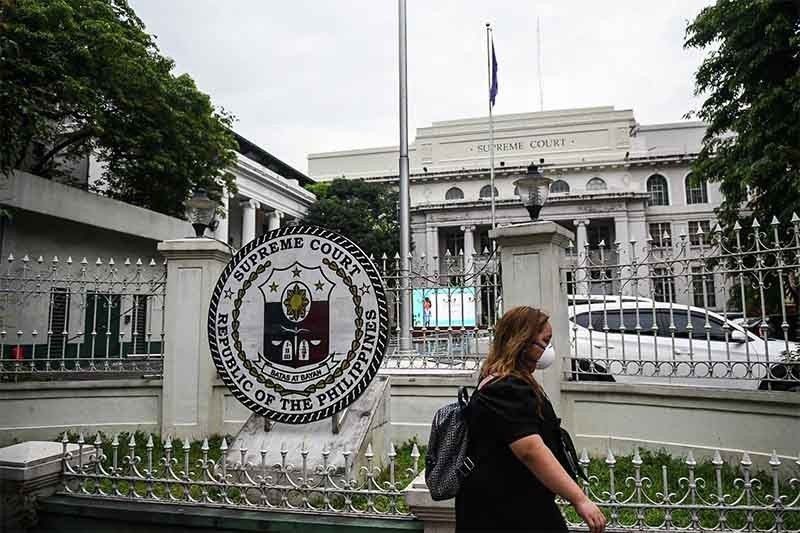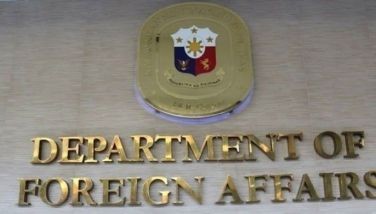SC: Prescription period for cyber libel is 1 year, not 12,15 years

MANILA, Philippines — Cyber libel cases should be filed within a year upon the discovery of the complainant, the Supreme Court (SC) clarified in a decision released on Friday.
The decision promulgated by the high court’s third division on Oct. 11, 2023 said that the prescription period for cyber libel should be based on the Revised Penal Code (RPC), and not the Republic Act (RA) No. 3326 or an act that defined the duration of prescriptions not included in the RPC.
The SC laid down the new rule, which departed from the previous doctrine that adhered to a prescriptive period for cyber libel of 15 years after a petition of former lawyer Berteni Causing.
Causing contested the dismissal of his motion to squash to dismiss the cyber libel charge filed against him by former Rep. Ferdinand Hernandez (South Cotabato) on Dec. 16, 2020.
The former lawyer was indicted by the Quezon City Prosecutors Office for two counts of cyber libel, following a Facebook post on Feb. 4, 2019, and April 29, 2019, that accused Hernandez of allegedly pocketing P226 million worth of relief goods for Marawi evacuees.
On June 28, 2021, Causing filed a motion to quash before the Quezon City Regional Trial Court arguing that libel under the Cybercrime Prevention Act did not create any new crime but “merely recognized a computer system as another means of committing libel” as defined by the RPC.
Causing then argued that the prescription for the offense should be similar as defined by the RTC which indicated a one-year prescription period for libel.
However, the Quezon City RTC dismissed the motion, saying that the two cyber libel charges against Causing has not lapsed its prescription period. It also emphasized that the prescription would be determined on Act No. 3326, as there is no prescription period mentioned in the anti-cybercrime law.
“It pointed out that because cyber libel is penalized by RA 10175, which does not provide a prescriptive period for the said crime, the period must be determined based on Section 1 of Act No. 3326 in relation to Section 6 of RA 10175,” the resolution read.
The penalty for libel indicated in the RPC is prison correcional or six months to six years of possible imprisonment, but Section 6 of the Cybercrime Prevention Act stipulates that any offense punishable by the RPC will have a penalty of one degree higher.
Thus, applying Act No. 3326, which indicated 12-year imprisonment for crimes with penalties of imprisonment of six years or more, the Quezon City RTC concluded that the cyber libel’s prescription should be 12 years.
It could be recalled that the 12-year prescription has also been used by the Manila Regional Trial Court in convicting Nobel laureate and Rappler’s chief executive officer Maria Ressa for cyber libel in 2020.
However, the RTC further added that due to the “one penalty higher” provision on penalties under Section 6 of the Cybercrime Prevention Act makes the offense an “afflictive penalty” which makes the prescription of a crime be at 15 years, as indicated in the RPC.
The 15-year prescription has also been mentioned in the Tolentino vs People of the Philippines case, also known as the Tolentino doctrine, which Causing also raised as invalid as it is an "unsigned resolution."
Following the RTC’s decision, Causing filed a motion for reconsideration in the same court, but was denied.
What is a prescription?
A prescription refers to the period during which legal action can be taken against someone for committing a crime.
Once the prescription has lapsed, the authorities can no longer prosecute or penalize the individual for that specific offense.
It serves as a limit on the time within which legal actions must be initiated, ensuring that individuals are not indefinitely vulnerable to prosecution for past actions.
Prescription of criminal offenses is defined under Article 90 of the RPC and in Act No. 3326.
Supreme Court decision
Meanwhile, Causing assailed the RTC decision before the SC arguing that the issues he raised were legal, particularly, the correct interpretation of criminal laws on the prescription of cyber libel.
The former lawyer raised the same argument that the Anti-Cybercrime law did not create a new crime. He also assailed the Tolentino doctrine.
The high court, however, denied Causing’s petition due to lack of merit and said that prescription is a defense that must be proven in court.
“Hence, the RTC is correct in denying Causing’s Motion to Quash,” the SC said.
Raised valid points in the Tolentino doctrine
Due to Causing’s petition, the SC said it had reviewed the Tolentino doctrine.
Despite dimissing Causing's motion, the high court’s third division agreed with the former lawyer and emphasized that cyber libel is not a new crime and must be treated like how it is defined in the RPC, which has a prescription period of one year.
“The Court rules in favor of Causing…in determining the prescriptive period of Cyberlibel, the RPC, not Act No. 3326, should be applied,” the SC said.
The high court’s third division first cited the decision in a 2014 decision of Disini v Secretary of Justice, or the case which assailed the Cybercrime Prevention Act, which stipulated that the libel being committed in cyberspace is the same libel defined in the RPC, but committed online.
“RA 10175 simply recognizes a computer system as ‘similar means’ of publication and makes the use of information and communications technology in the commission of Libel as a qualifying circumstance,” the tribunal said.
“In resolving the motion for reconsideration of the Disini Decision, the Court reiterated that Cyber Libel is not a new' crime for it is ‘essentially the old crime of libel found in the 1930 Revised Penal Code and transposed to operate in the cyberspace,’” it added.
The SC also cited the minutes of the bicameral committee in recognizing that it is the same libel punished under the RPC.
“However, it is also noteworthy that, in enacting R.A. No. 10175, the legislature did not impose a prescriptive period for Cyber Libel different from the provisions on [the] prescription of crimes in the RPC, notwithstanding its intent to increase its penalty,” Associate Justice Filomena Singh wrote in her separate concurring opinion.
Besides the prescription period, the SC also specified that the commencement of the period should be based on when the aggrieved party first became aware of the purportedly defamatory statements.
Must be 'favorable to the accused'
The SC’s third division emphasized that the interpretation of statutory provisions should always be favorable to the accused.
“It bears repeating that in interpreting statutory provisions on the prescription of crimes, what is more, favorable to the accused must be adopted,” the SC said.
“Considering that Article 90 of the RPC provides the shorter prescriptive period at only one year and is, therefore, more favorable to the accused, it should prevail over the·application of Act No. 3326, which would make Cyber Libel prescribe in 12 years,” it added.
Article 90 of the RPC indicates the prescription period of the offenses committed.
In a separate opinion, Singh also said that the intention of setting the prescription period for libel to one year was to “synchronize” it to the prescriptive period for instituting a civil action.
In criminal offenses like libel, a complainant can pursue both criminal and civil liability against the accused. The liabilities could be both filed at the same time or can be filed separately.
“I thus submit that considering the specific intent for the setting of the one-year prescriptive period for criminal action for libel, which is independent of the prescribed penalty, the intent of the legislature in penalizing cyber libel did not extend to giving it a prescriptive period different from that provided under the RPC for libel,” Singh wrote in her separate concurring opinion.
- Latest
- Trending
































